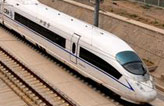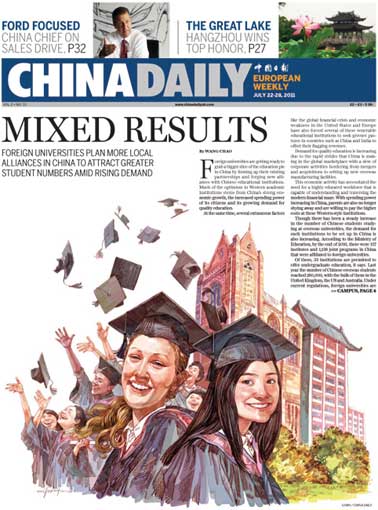Greener pastures
Updated: 2011-07-22 10:56
By Wang Chao (China Daily European Weekly)
The cost of this "China adventure" is relatively low, 188,000 yuan (20,300 euros) in tuition fees, compared with the average 500,000 yuan (54,000 euros) in top US schools.
|
 |
But a good opportunity doesn't necessarily mean good compensation in China, international MBA graduates have found out.
Chin Foo, who worked in e-business consulting in Europe and Australia for nine years, says: "The earnings are not necessarily better than in Europe, but more exciting for sure, in a way that things are changing very fast."
Foreign applicants are also feeling increasing pressure from their peers - with a screen-out ratio of nearly 70 percent, they have to keep their fingers crossed to be admitted. "We intentionally keep the foreigner's ratio at a certain level," says Gao, "so they have the opportunity to interact with Chinese classmates and get involved in the community."
However, the chances of landing decent jobs are diminishing as the number of international MBAs increases, especially for those with limited Chinese-language ability.
"I have been to career fairs and the first question they ask is: 'Do you speak Chinese?' If 'no', then 'sorry'," says Chin Foo.
She did not expect the job market to be so competitive among expats, especially for high-paying jobs at multinationals. "There are just so many expatriates with strong background, so language proficiency and understanding of the culture become crucial."
With a Chinese great-great grandfather who migrated to France in the early 1900s, Chin Foo has a Chinese appearance but little cultural connection with the country.
"If a person looks white but speaks Chinese, people say 'Oh, he is great'; but if a person looks Chinese but speaks terrible Chinese, people will say 'go to hell'," Chin Foo shrugs. "That would be me!"
Although not satisfied with the compensation, Chin Foo doesn't want to risk starting her own business. "If I want to start my own business, I need to drink with the officials; I'm a woman and I'm small, I cannot do this," she jokes.
China is not a dreamland paved with gold, and foreigners are no longer the rage of the market just by being white and speaking English. "I face competition from my Chinese classmates, who speak Chinese and English, and know the society very well," says Jonathan Ley who started a business after his MBA from Peking University.
Ley didn't come to China for money, but for fun. His parents own a big chain supermarket, several pig farms and even a baseball team, in Mexico.
After working in Mission Foods in Shanghai for two years, Ley decided to say bye to Mexican tacos and tortillas. As the eldest son in family, he was supposed to go back to take care of the family business, but he persuaded his family to let him stay, and started selling bicycles with a "start-up fund" of $300,000 (211,300 euros) from his father.
Ley named his company Danqixia, or "the lonely rider", selling high-end sports bicycles and components imported from the US. The most expensive bicycle made of carbon fiber costs 50,000 yuan. These brands never had distributors on the mainland before and bicycle fans had to order them from Hong Kong or Taiwan.
"Several years ago, there were 9 million bicycles in Beijing, but this year only 4 million remain as most riders have bought cars," Ley says, "A girl famously once said she would rather cry in the back seat of a BMW, than laugh on a bicycle; but I want to say 'you can also laugh on a bicycle' by introducing my products!"
But Lay found his knowledge of marketing from his MBA degree was not enough to deal with a business. "The MBA in China focuses on finance, while few marketing classes are taught; it is helpful for my classmates who want to work in banks and other financial institutes, but bad for us self-employed graduates."
Gao from Tsinghua University agrees. "Improvements need to be made on curriculum and case studies. Every Wednesday we have a lunch meeting with faculty to discuss issues that bother them, like the evaluation of teachers and cases we pick."
"In terms of infrastructure, MBA teaching in China does lag behind some Western countries - for example, there are fewer printers in the library, few private study rooms, and other insufficiencies - but we are making progress, we just need some time."
E-paper

The perfect cut
Companies need to revamp, standardize to stave off quality challenges
Crowning achievement
Living happily ever after
Let there be smell
Specials

My China story
Foreign readers are invited to share your China stories.

90th anniversary of the CPC
The Party has been leading the country and people to prosperity.

Setting the pace in Turkey
China is building a 158-km high-speed railway in Turkey.
